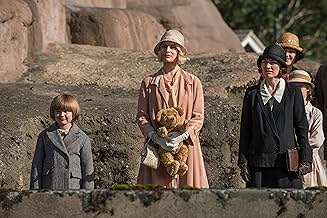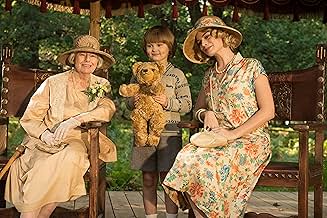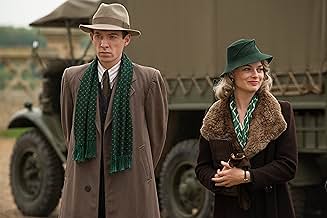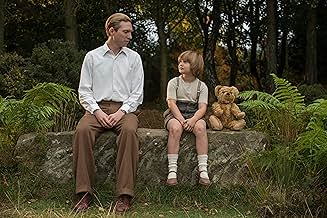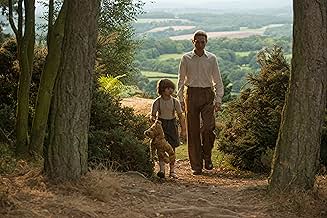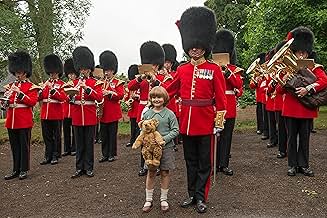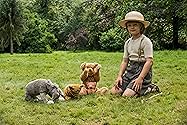Ein Einblick in das Leben des Autors A.A. Milne und die Entstehung der Geschichten rund um Pu den Bären, wozu er durch seinen Sohn C.R. Milne inspiriert wurde.Ein Einblick in das Leben des Autors A.A. Milne und die Entstehung der Geschichten rund um Pu den Bären, wozu er durch seinen Sohn C.R. Milne inspiriert wurde.Ein Einblick in das Leben des Autors A.A. Milne und die Entstehung der Geschichten rund um Pu den Bären, wozu er durch seinen Sohn C.R. Milne inspiriert wurde.
- Regie
- Drehbuch
- Hauptbesetzung
- Auszeichnungen
- 2 Gewinne & 3 Nominierungen insgesamt
Empfohlene Bewertungen
The film as a whole addresses several themes and it's really a bit of a mishmash – it's not just about the creation of the Winnie the Pooh books; it's about the impact of war, the troubles with early 20th century parenting, tricky father-son relationships, the joy and innocence of childhood, and the pain and price of fame. This all works as both a strength and a weakness of the film; in many ways it's wonderful to have such a wealth of topics and the variety keeps things fresh and interesting. On the other hand, some themes aren't fully explored to the extent they could be and it feels as though it's missing something occasionally. It never really focuses on one theme and so does tend to meander around all these topics, telling a vague story; at times it seems to be more a series of scenes with just a semblance of story. Of course this is because the story itself is fairly simple, so it's nice that they enriched the plot with so many themes; it just feels as though it could have benefited from a little more detail.
Nevertheless it's a film that's a joy to watch and brings with it a load of emotions – sniffles and tears seemed to permeate the cinema. This is down to a couple of things; firstly the characters and the story they go through together; but more than that all the references (some obvious, some subtle) to Winnie the Pooh and the rest of Milne's work. From small quotations and images, to creating a little wooden hut to house one of Billy's toys, there are plenty of nods to Winnie the Pooh and these can't fail to bring a nostalgic tear to anyone and awaken fond childhood memories. The childhood especially is heavily romanticised and anyone can identify with Billy Moon in some way, bringing to mind all the happiness and innocence we experienced as children. This is all complimented by beautiful cinematography, making the wilds of Ashdown Forest seem absolutely stunning and really strengthening the magical quality of childhood and its inexhaustible supply of imagination and charm. In fact it's this middle section where the world of Winnie the Pooh is created that is the strongest part.
There aren't a great many characters in this film, making it all seem more intimate, allowing us to grow attached to the characters – though at times this can be challenging. As excellent as Gleeson is, it can be sometimes difficult to understand and empathise with him as his character is so stiff and reserved; still Gleeson gives us a wonderful contrast to this and how time with his son helps him to loosen up and re-discover his 'inner child'. Margot Robbie's Daphne comes across as a missed opportunity. Stunning and beautiful as always, it's hard to imagine Robbie playing a detestable character, but this she manages to do and do well. It's just the writing doesn't really seem to do her credit as we aren't given a real insight into her character. Kelly Macdonald and Will Tilston do shine though. Macdonald's Olive grounds the film as the friendliest, least complex adult character and Tilston exceeds all expectations you would have from a nine year old in their first ever acting role. Sheer innocence and childishness emanates effortlessly from his big eyes and little movements. He really is the heart of the film and fortunately they make the most of him. Sadly every boy has to grow up, but Billy Moon's 18 year old self played by Alex Lawther fills the shoes of his younger counterpart well, giving us the necessary angst and emotion needed.
Perhaps not quite the early Oscar contender I hoped for and it lacks some of the magic that I loved in similar film Finding Neverland. However, this is still a great film, dripping with emotion, nostalgia and a romantic view of childhood; exploring a wealth of themes and with some excellent performances (particularly from the titular Christopher Robin) and affectionate references to a childhood classic, Goodbye Christopher Robin is a lovely, bittersweet film for the whole family. Bring the tissues – this one's going to move you.
Hearing that there was a biographical drama based on the man, his life and his family, the desire to see 'Goodbye Christopher Robin' was overwhelming. Was not disappointed at all after seeing it today, it was a lovely biographical drama even with Milne's life not being what one would expect reading the stories or being familiar with the timeless characters, his dark and troubled personal life being the anti-thesis of the innocent and charming world created in his Winnie the Pooh stories. That was actually what was so fascinating about 'Goodbye Christopher Robin'.
'Goodbye Christopher Robin' in biographical terms fascinates and illuminates. But the film fares even better judging it as a film on its own merits, on this front it is a lovely very good film that is neither the potentially cutesy cookie-cutter film one might think it would be reading the title or the overly dark and joyless one that one would fear upon looking up what the film is about. It's more layered than either.
The film looks great for starters. The beautiful cinematography, with its vibrant hues, really brings the film to life in a way that reminds one of how a story book would. The settings and costumes are both sumptuous and vivid, making the viewer feel like they've been transported in time to that period and being part of it. Carter Burwell's string-heavy score is luscious and stirring in its elegance. Both combined creates a really nostalgic quality that could have been at odds at the dark portrayal of Milne's and his family's personal life but it's an effective contrast.
When it comes to the writing, 'Goodbye Christopher Robin' is very intelligently and thoughtfully written and, considering that it has a subject matter where it is so easy to go heavy-handed and be too much of one tone, has evidence of sensitivity and nuance with touches of bitter irony in how such a happy childhood depicted in the stories was very much a miserable one in real life. The nods and references to Milne's work are clever and affectionate, enough to make one's eyes well up with aching nostalgia. The story is cohesive and never feels like it's jumping around too much or lacking momentum, it also has a lot of heart and affecting poignancy in how Christopher tries to get his father to loosen up and the interaction with his nanny (along with Christopher the warmest and most sympathetic character in 'Goodbye Christopher Robin').
Direction lets the story to breathe but doesn't fail in giving it momentum. The performances are near-uniformly strong. The central character in fact is Christopher Robin himself, and while Alex Lawther does very well with teenage Christopher the star here is Will Tilston, who gives a touching and far more layered performance than one would think he was capable of. Instead of being overly-cute, he evokes tears of both playful joy and vulnerable sadness and the film particularly comes alive with the father/son relationship.
As Milne, Domhnall Gleeson is excellent, whether one feels empathy for him is another story but he portrays Milne with an appropriately straight back and reserve and he is every inch the troubled figure. The levity of the story comes in the nanny character played by Kelly McDonald, the warmth and charm of her portrayal is much needed and her common sense invaluable.
By all means, 'Goodbye Christopher Robin' is not without short-comings. The biggest one being the one-dimensional and without-redeeming-qualities character writing for Daphne which consequently makes Margot Robbie portray her far too firmly and coldly, even in the subject matter these approaches didn't gel.
Short-coming number two is not buying and being put off somewhat by Milne and Daphne's far too casual, uncaring even, attitude for Christopher's welfare. This is something that makes one endear to them even less.
Overall, lovely, moving film. 8/10 Bethany Cox
It reminded me in some ways of "Finding Mr Banks", but touched me more deeply. There are movies you go to watch to escape the real world. This was a movie that helped me to remember what is important in this world and feel better for it.
It was touching, heart breaking and had times that all parents can relate to. In the end it showed me how important it is to spend time with your children.
It is a movie I will be adding to my collection.
It had strange resonances for me personally, as my grandmother was a famous and celebrated author, who used me as inspiration for several of her children's books, and also as a subject for one of her academic books for adults.
During my early childhood, I spent many happy days playing imaginative games with my grandmother - always followed around by a photographer - and those games became the basis for her stories, with the photographs of me used to illustrate them. At the time I was quite happy about this, as it made me feel special, but I am now very well aware that I was being exploited.
Like Christopher Robin, I was never asked permission to be in her books, nor was I ever paid (although I inherited a modest amount of money when she died, so I suppose that could be considered payment of sorts).
Unlike Christopher Robin, I never resented the books I was in, and I never felt that my childhood memories had been stolen or commercialised. But my situation was never as drastic as his, and my grandmother's celebrity didn't even come close to that of A.A. Milne. However, there are enough parallels to have given me a few shivers while watching this movie.
Others have commented on its excellence, so I won't belabour that point, except to say that I agree. As a film it is beautifully crafted and (for me anyway) endlessly re-watchable.
I disagree with the negative comments about the stilted acting. If anything I felt they needed to be more stilted to be properly true to the period. I do agree that Margo Robbie's accent was uneven, but performance-wise I felt she did very well in what was perhaps the hardest role to perform convincingly.
As others have mentioned, the best performances came from the two boys playing Christopher Robin, although I also particularly liked Stephen Campbell Moore's understated warmth, and - for the first time in her career- I actually found myself liking Kelly Macdonald, an actress who has irritated me in every other film in which I've seen her. Here she exudes warmth and tenderness, and in a well-pitched and technically difficult performance manages to display undercurrents of disapproval and sympathy to the audience without over-egging the pudding.
The cinematography by Ben Smithard also bears special mention, bringing to the screen a subtle yet richly evocative atmosphere of nostalgia and childhood innocence without sacrificing realism or becoming overly stylised.
In fact, one of this film's many technical merits is the fine balance it achieves between all its various flavours and ingredients; each one subtle and understated, yet combining to create a rich and satisfying whole.
As an overall viewing experience it has much to recommend it, and very little about which to complain.
I now wish I had a stronger relationship with those little critters and that lovable boy, for I could have used the distraction from the aftermath of WWII just as Pooh was able to do for the world after the war to end all wars. Author A.A. Milne (a stoic and yet lovable Domhnall Gleeson) was traumatized by his service in the war, and moved slowly to erase that PTSD while creating Pooh. The film spends too much time on his trauma, but it does help fill out Milne's character.
Yet, this is the story of Billy Moon (a remarkably-dimpled, serene Will Tilston), as Christopher Robin is called in real life, who supplies his dad with inspirations for the book. The film centers on remote dad's growing love for the boy and the book while remote mom goes off to London to do who knows what. The film carefully shows how children might be lucky to have a nanny like Neu (Kelly Macdonald) to give them love and some creative inspiration along the way.
Goodbye Christopher Robin is a successful biopic because it doesn't spare the story of anti-helicopter parents who endanger the mental health of their children with their absences. As fame overtakes the Milne family, the film still relays the sense of wonderment Billy had as a child immersed in love of his forest, animals, and imagination.
The biopic may be counter to what we expected of a world-renowned author of a book for children. That he had difficulty initially interacting with his own child is unusual, but the film is successful showing how he warms up and creates a masterpiece as well.
Though not always a feel good movie, Goodbye Christopher Robin makes you wish he'd never go away. It looks like he never will.
Wusstest du schon
- WissenswertesThe film's depiction of C.R. Milne's relationship with his parents is relatively accurate. The actual C.R. never forgave his father for exploiting him (perhaps inadvertently) to sell books. Instead, he learned to accept what had happened and lived with it until he died in 1996. His relationship with his mother was worse; she disapproved of C.R. marrying his cousin. After A.A. Milne died in 1956, C.R. had almost no contact with his mother until she died fifteen years later. C.R.'s only child, his daughter Claire, was born with cerebral palsy. She died in 2012 at age 56.
- PatzerWhen the Guards band are playing, several are wearing modern day medals (Iraq, Afghanistan etc.). The close up of the cymbal player shows the Queen's Golden and Diamond Jubilee Medal which weren't awarded till 2002 and 2012, alongside a LSGC with Queen Elizabeth II on it.
- Zitate
Daphne Milne: You know what writing a book against war is like? It's like writing a book against Wednesdays. Wednesdays... are a fact of life, and if you don't like them, you could just stay in bed, but you can't stop them because Wednesdays are coming and if today isn't actually a Wednesday it soon will be.
- VerbindungenFeatured in Box Office: Folge vom 28. September 2017 (2017)
- Soundtracks2 Waltzes, Op. 54: Waltz No. 1: Moderato in A Major
Written by Antonín Dvorák
Performed by Vlach Quartet Prague
Courtesy of Naxos Rights US Inc.
Top-Auswahl
- How long is Goodbye Christopher Robin?Powered by Alexa
Details
- Erscheinungsdatum
- Herkunftsländer
- Offizielle Standorte
- Sprache
- Auch bekannt als
- Hasta pronto, Christopher Robin
- Drehorte
- Produktionsfirmen
- Weitere beteiligte Unternehmen bei IMDbPro anzeigen
Box Office
- Bruttoertrag in den USA und Kanada
- 1.735.251 $
- Eröffnungswochenende in den USA und in Kanada
- 57.917 $
- 15. Okt. 2017
- Weltweiter Bruttoertrag
- 7.401.949 $
- Laufzeit1 Stunde 47 Minuten
- Farbe
- Sound-Mix
- Seitenverhältnis
- 1.85 : 1
Zu dieser Seite beitragen








